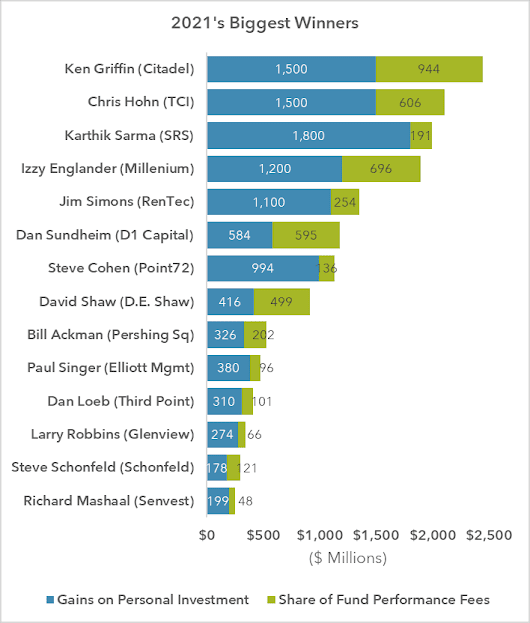Many people get the Sunday-night blues...as they wonder where the weekend went and contemplate the upcoming week's work. One way for companies to reduce employees' anxiety may be to allow them to ease into the work week. In fact, they may have to. The Advanced Workplace Associates surveyed nearly 10,000 people working in finance, technology, energy sectors around world and found that 86% of workers want to want to work from home at least two days a week, preferably Monday and Friday. With companies struggling to find workers amid the Great Resignation flexibility and hybrid work are fast becoming a recruiting and retention tool. And we're pretty sure employees will appreciate it.
Wednesday, February 16, 2022
Tuesday, February 15, 2022
Wealth Porn: Hedge Fund Edition
Hedge Funds had another decent year...and that means mega payouts for the most successful managers. In 2021, the top 15 most highly-paid managers collectively made "only" $15.8 billion, down from $23 billion in 2020. Sure, things were tougher last year, with the average hedge fund generating 10.2% net returns versus 11.8% in 2020; but the average manager also did generate more alpha (Jensen's).
Source: HFR, MantabyeRegardless, there's nothing average about the 15 managers below, who run some of the biggest funds in the industry and often charge fees north of 2% & 20%.
Monday, February 14, 2022
The Power of Pee & Poo
Nature "wastes" nothing. Everything is broken down and reused. The importance of waste in the natural balance of the ecosystem is highlighted in a couple of featured findings. One, highlighted in Wired magazine, demonstrates how whales act as the oceans' gardeners: "When a blue whale goes, it goes big." The phenomenon was recently captured on camera, as shown below:
Monday, February 7, 2022
Chrome Has a New Logo
After eight years of deep research, the brightest minds at Google have once again released a new logo for Chrome, easily the worlds most popular web browser and much more. After it's understated launch in 2008, Chrome quickly grew in popularity and became the foundation for a larger suite of products, including the Chrome OS. Today, "Chrome accounts for nearly 64% of all browser usage on all platforms today. The only other browser that comes “close” is Safari, with nearly 15.5% thanks to iOS devices. Firefox comes in third at a mere 4.4%." Chrome also helped Sundar Pichai become CEO of Alphabet.
So here it is. You can clearly see the radical evolution of the logo...or not? After all, why mess with something that works so well?
Carlos Supreme: Alcaraz Achieves Career Grand Slam
On Sunday, Carlos Alcaraz made history when he became the youngest man ever to complete a career Grand Slam after defeating Novak Djokovic ...

-
This is more a discussion than a "debate" between two giants of the economics profession. Both are Democrats and agree on the basi...
-
Russian oligarch Roman Abramovich purchased Chelsea FC in 2003 for £140 million (£60 million for the club plus £80 million of debt). His la...
-
Even though many of us are still working from home and days of the week can sometimes meld into one another, the weekend still seems to (and...









